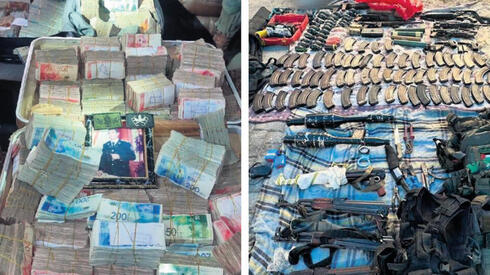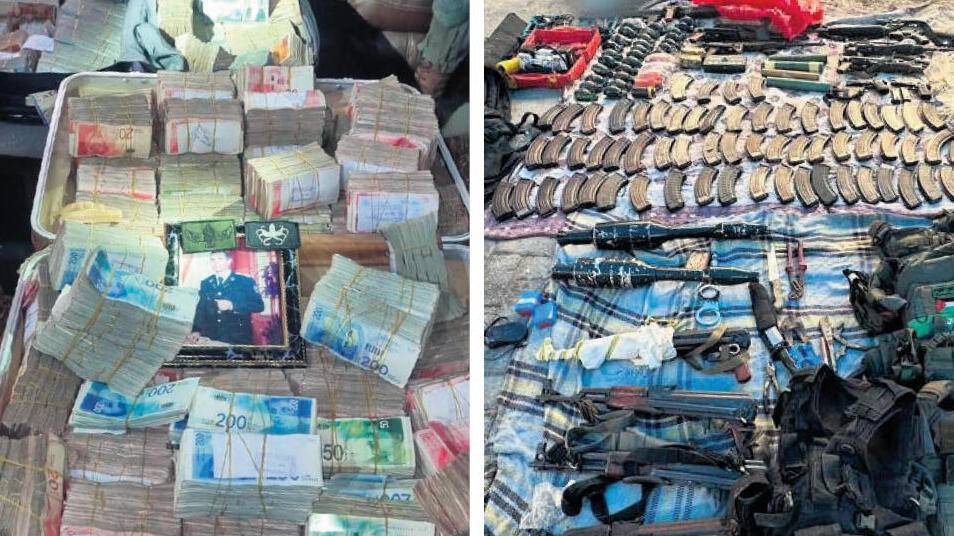
Israel seized over $1 billion in terror funding over past five years
Data from the National Bureau for Counter Terror Financing of Israel reveal that significant economic sanctions have been imposed on terrorist organizations in recent years. However, the scale of Hamas's economic activity, along with the funds the Israeli government approved to bring into Gaza, will make it difficult to bring down Hamas' financial apparatus
Thousands of terrorists, large stockpiles of weapons and missiles, a network of tunnels and an organizational infrastructure in Gaza that is still functioning after two and a half months of intense fighting, raise the question of what Israel did over the years to stop the financial growth of the Hamas terrorist organization.
Data from the National Bureau for Counter Terror Financing of Israel (NBCTF) in the Ministry of Defense obtained by Calcalist, some of which are being published here for the first time, indicate that the body that is at the forefront of Israel's fight against the financial strengthening of terrorist organizations, imposed economic sanctions - seizing and freezing - funds and assets amounting to approximately NIS 3.76 billion (over $1 billion) since it was established in 2018. These amounts, it is important to note, are not related to the suitcases of cash that entered Gaza from Qatar over the years with the approval of Israeli governments.
1 View gallery


Two suitcases with five million shekels in cash were found by the IDF in the home of a senior Hamas official in the Gaza Strip last week.
(IDF Spokesman's Office)
According to the data, the activity of the NBCTF since its establishment has led to the freezing of funds that were supposed to go to terrorist activities, to terrorist operatives or to their families from payments that Israel is supposed to transfer to the Palestinian Authority; to the seizure of cash amounting to approximately NIS 50 million ($14 million); and to goods amounting to approximately 16 million shekels ($5 million).
On the one hand, this is a significant amount. On the other hand, two much less optimistic insights can be derived from this amount. The first is that if, even after the large sums seized, Hamas and Hezbollah are still operating with force in the field, the scale of their economic activity is clearly much larger and more significant. Second, given that there is no way to completely block the transfer of funds and goods, but only to try and slow them, the claims of elected officials and military personnel that it is possible to "economically collapse Hamas" sound arrogant to the point of impossibility. Just like fighting crime - and even more so due to unique reasons in the case of Hamas - a complete economic collapse sounds like an unlikely scenario. Political considerations, such as agreements with Egypt on the control of the Rafah crossing, which is located in the south of the Gaza Strip and allows the passage of goods and money without close supervision; international considerations, such as Israel's money transfers to the Palestinian Authority according to the Paris Agreements, which are the economic annexes to the Oslo Agreements, as well as aid money for refugees that are transferred internationally to Gaza and suitcases of money that entered at least until recently from Qatar allegedly for humanitarian needs; as well as operational considerations, such as the difficulty of completely stopping smuggling from the Rafah crossing, and the lack of complete intelligence on every suitcase of cash - indicate that this is an almost impossible task.
Moving from the Mossad to the Ministry of Defense
So what is the NBCTF and why is it engaged in a financial attack on terrorist organizations? Until 2018, it was the Mossad that tried to fight the sources of funding and the financial infrastructure of the terrorist organizations. "The unit was not disbanded," former Mossad head Yossi Cohen said this weekend In an interview with Channel 12, "But when I assumed the position of head of the Mossad, I said to the Minister of Defense at the time (Avigdor Lieberman): 'Let's move the visible part of the activity to the Ministry of Defense,' and we conveyed it together with the head of the unit at the time, Paul Landes." Landes (a brigadier-general in the reserves), who is still the head of the NBCTF, is the one who served as the head of the Israel Money Laundering and Terror Financing Prohibition Authority (IMPA) between 2009 and 2015, when he moved to the Mossad to continue to head the unit.
There were two reasons behind the decision to transfer a central part of the activities of the NBCTF to the Ministry of Defense. The first is to significantly increase the capabilities of the economic attack against terrorist organizations and operatives based on a newly constructed model, centered on a series of economic sanctions that the minister can use effectively and quickly.
The second, activity in various ways against Israeli Arab citizens, something that the Mossad cannot carry out.
The model they developed at NBCTF was to publish administrative orders or declarations of connection, involvement, financing or terrorist organizations, and distribute them to regulators, banks, insurance companies, credit card companies and other financial institutions in Israel and around the world, in order for them to act to block or to demand the withdrawal of funds from a person identified with terrorist activity. This can be a body, company or association that transfers funds to activists, and recently, following a change in legislation, also a private person.
The NBCTF collaborates with representatives of all the organizations in the relevant intelligence and enforcement bodies - the Mossad, the Shin Bet, Israeli Military Intelligence, the police, the Tax Authority. Based on an intelligence and legal opinion, the Minister of Defense signs administrative orders - without the need to conduct a lengthy investigation or go through a court. In addition, the NBCTF transfers information accumulated by the intelligence and enforcement agencies to foreign countries so that they can also act on their own.
"It's a big local and international effort to block the money routes, given that for every route that is closed, the terrorist organizations try to open another route," says a senior official at the Ministry of Defense who deals with the financial suppression of terrorism. "You can't stop everything, but when you close one axis, it takes time for them to try to find an alternative axis. A new account, a new bank, and this makes it very difficult for them and is not always possible. In 2023, much in light of Minister Yoav Galant's attention to the issue, the orders were significantly expanded and this is evident from their scope in relation to 2022." According to the data, there were 363 such orders and announcements this year compared to 201 in 2022.
"Dollars for terrorism from Iran"
The financial sanctions do not amount only to the freezing and blocking of accounts, credit cards and more. Some of the NBCTF connections, for example, are with crypto exchanges around the world that, following its request or the police's, block terrorist activity. However, in the end, according to a source in a security body, this is not the main activity, despite its importance, and it is on a significantly smaller scale compared to the volume of activity of the terrorist organizations.
"With crypto, you can't buy in the market in Gaza or pay activists," says the source. "With all the financial loopholes, the organization and the activists need cash. And in the end, they all want dollars, which is the main currency that finances terrorism, and is often channeled from Iran, which is the engine behind terrorist organizations such as Hamas, Hezbollah or the Houthis in Yemen," explains the source.
When cash is king, the work of the NBCTF becomes much more complex. Especially when the Rafah crossing, for example, between the southern Gaza Strip and Sinai, has not been under Israeli control since the disengagement plan in 2005, as well as the leaving of the Philadelphi Route, of which the Rafah crossing is a part. When Hamas took control of the Gaza Strip, as part of its conflict with Fatah in 2007, smuggling tunnels were established for weapons, fuel and equipment and, of course, money.
"If a person comes with a suitcase of cash with a million dollars to the Rafah crossing and Israel has no intelligence information about it, it is impossible to stop it," admits a senior official in the Ministry of Defense, in light of the photos published last week by an IDF spokesman of two suitcases containing 5 million shekels in cash that were seized In the home of a senior Hamas official in the Jabalia area of the Gaza Strip.
The difficulty of blocking the routes
The Israel Defense Forces has succeeded since 2018, and according to its data mainly in 2023, to impose economic sanctions on money and goods as part of various operations, mainly at the Kerem Shalom crossing which is under Israeli control.
And yet, as we learned from the beginning of the war, it is far from enough. One of the reasons for the great difficulty in blocking the cash is the so-called old banking system of the Hawala. This is a method often used by foreign workers around the world who want to transfer money to their families, without the need to transfer the funds through official and supervised banks or financial institutions. This is essentially a trust method, in which a money exchanger in country A asks a money exchanger in country B to pay on behalf of a family member, when in the future the exchangers offset each other.
"Not everything can be caught and frozen"
As Cohen, the former head of the Mossad, pointed out in the television interview, not all of the terrorist organizations' economic attack operations were transferred to the Ministry of Defense under the NBCTF. Some of the activity that is carried out is still under the Mossad, and is of course confidential and secret.
At the beginning of last week, The New York Times published that in 2018, classified documents were seized from the computer of a senior Hamas official, detailing assets held, among others, in the United Arab Emirates and Turkey. According to the publication, which relied, among other things, on the testimony of the former head of the Mossad's Economic Warfare Division, Dr. Udi Levi, the U.S. and Israel knew about this, but preferred to focus on Iran. The report details a portfolio of assets, real estate and commercial companies worth about half a billion dollars.
The Mossad, which is under the Prime Minister's Office, headed by Benjamin Netanyahu, was directly criticized in The Times for knowing and not acting on the matter, and issued a vague statement in response to the report, stating essentially that the Mossad has always acted under the direction of Prime Minister Benjamin Netanyahu to thwart the transfer of terrorist funds to Hamas, and that any other claim is baseless.
"The Hamas portfolio of investments today is tens of percent lower, this is not what brings them the bulk of the money," says the senior official. "As a result of orders issued by the Ministry of Defense during 2022, a significant part of this investment portfolio was significantly damaged, but it must be understood that not everything can be completely stopped. Orders from the Ministry of Defense abroad are respected, but it is not possible to seize and freeze everything . The economic war against the terrorist organizations is long, difficult and Sisyphean. We have successes, but it is impossible to stop everything."













